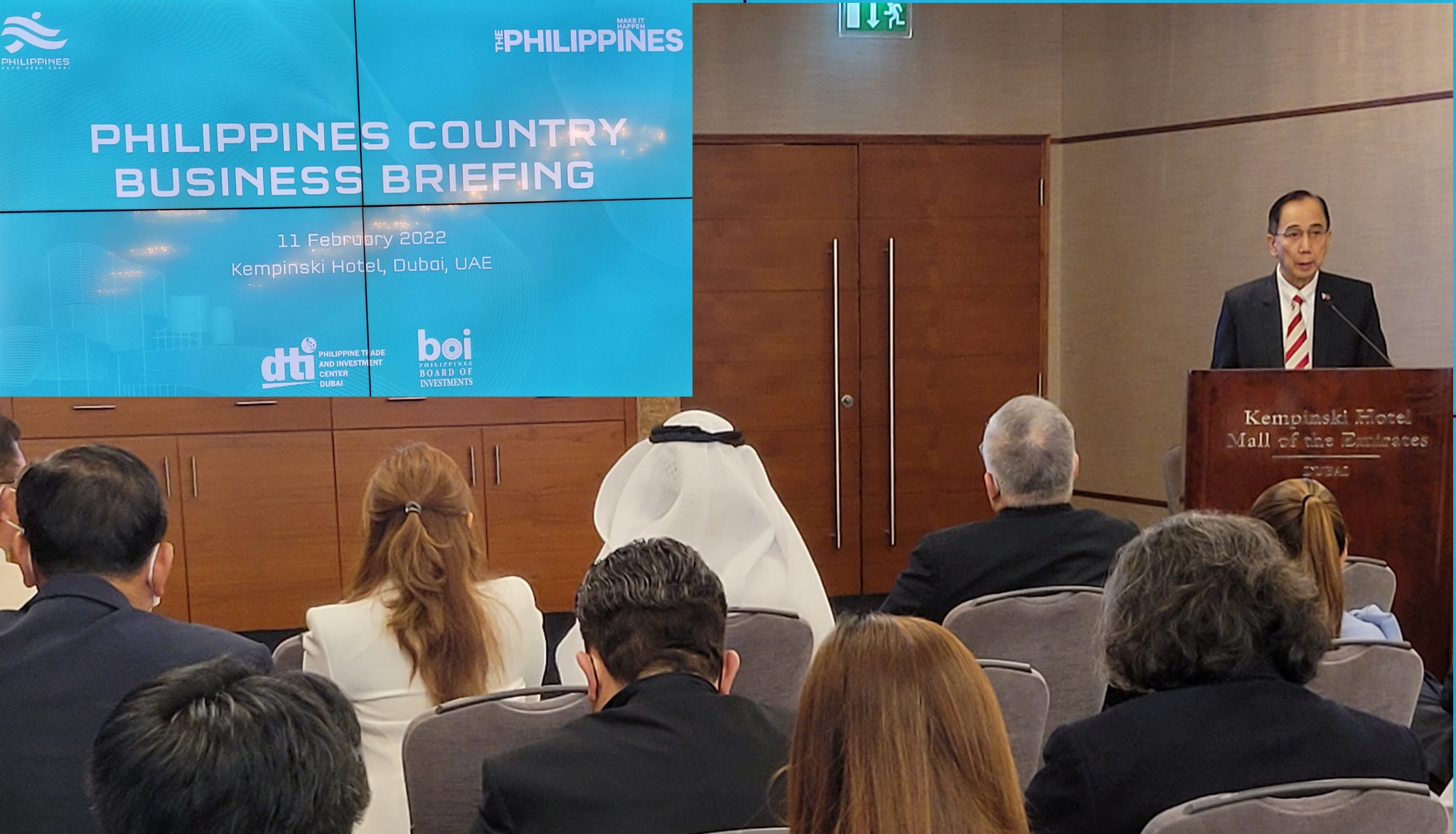
Highlighting the Philippines’ rich and untapped natural resources, skilled workers, availability of raw materials, and strong support from the government, Philippine Agriculture Secretary William Dar invited investors to venture into various agricultural and fishery industries in the country.
“The pandemic has allowed us the time for new beginnings, exploration, and discoveries. We sought to make our own backyard a thriving hub of agri-industrialization supporting the production of farmers and directly marketing for both local and international markets,” Secretary Dar said.
The agri chief, on February 11, 2022, presented to companies based in United Arab Emirates (UAE) and other Gulf Cooperation Council (GCC) countries, various areas for investment in Philippine agriculture stressing that F&B manufacturing, which is agriculture derived, contributes 46 percent (%) to the economy.
He also cited that the Philippine crops subsector continues to soar high with about 60% of agricultural Gross Value Added, and steadily grows despite the trail of calamities that hit the country in the last quarter of 2021.
Topping the long-list of investment opportunities that Dar tendered is coconut, which covers about 3.65 million hectares of farmlands. With globally competitive technologies and Filipino coconut farmers besting their regional counterparts in production and processing approaches, the Secretary underscored that the sector is a sound and viable investment.
At present, the coconut industry’s export is valued at around US$1.5 billion, and export potential of US$2.6 billion. Investment opportunities include coconut water processing technology and system, and white copra centers, and copra buying centers.
He added that one good investment window to look into is the Philippine “Carabao” mangoes, which has earned distinction globally for being the sweetest and most succulent.
“The world’s best tasting fruit is a largely untapped product with promising export and investment opportunities in cold storage facilities and research,” Dar said adding that the sector is capable of producing 740,000 tons of fruit per year valued at $640M.
Another export winner, which compels investment in production, post-production facilities, and processing, is the Philippine pineapple.
“At the moment, the value of our pineapple exports stands at $307M, and we see potential value reaching up to $881M,” the agri chief mentioned.
Dar added that there is ample room for UAE-based investors as demand growth in China is expected to fuel production in the next decade.
For banana, a total $1.6 billion worth of products were exported last year alone. As the second-largest exporter of Cavendish bananas worldwide, Dar said that the Philippine banana sector presents vast possibilities for investors to dive into. “With adequate investment in research and development, we are optimistic that we can double the value,” he said.
The fisheries sector also presents advantageous business ventures with Philippine waters stocked with unlimited fish supplies, and aquaculture as an emerging and promising industry.
Dar noted that there is a wealth of investment opportunities in the sustainable management of tuna in the Philippines, as well as the construction of post-harvest and processing facilities for the local marine fisheries. The Filipino tuna industry presently exports tuna to the United Kingdom, Germany, and Japan.
Ranking second in the world in terms of value, Dar said that seaweeds demand big returns even with small investments.
“With supportive government policies and rich natural resources, seaweed production in the Philippines is a simple endeavor, requiring little in the way of technology,” he added.
Lastly, the secretary called for investments in crab, announcing that around $99M-worth of crab products were exported to the US, Japan, Germany, and China last year.
“With sufficient investments for infrastructure and packaging technologies, we are certain that you can earn so much more,” he said.
The key agriculture industries presented before the UAE investors will be part of a new strategic investments priorities plan by the Duterte administration, including tax holiday incentives.
The DA, under the leadership of Secretary Dar, continues to level up the local agri-fishery industries through a reform agenda that features the four pillars: farm consolidation for increased economies of scale; modernization; industrialization; and professionalization of the farm workforce and human capital.
It has kicked off the establishment of infrastructure and technology hubs, putting in place innovations for processing and packaging of limitless farm and fishery commodities.
“The moment has come to harness vast energies and abundance of the Philippine Islands for the creation of a new business experience, an experience richer and deeper and more truly a reflection of the goodness and grace of the Filipino spirit,” Dar said.
In closing, he urged the audience to be optimistic, invest in Philippine agriculture, and share the triumphs of the evolving sector. ### (Adora Rodriguez, DA AFID)














